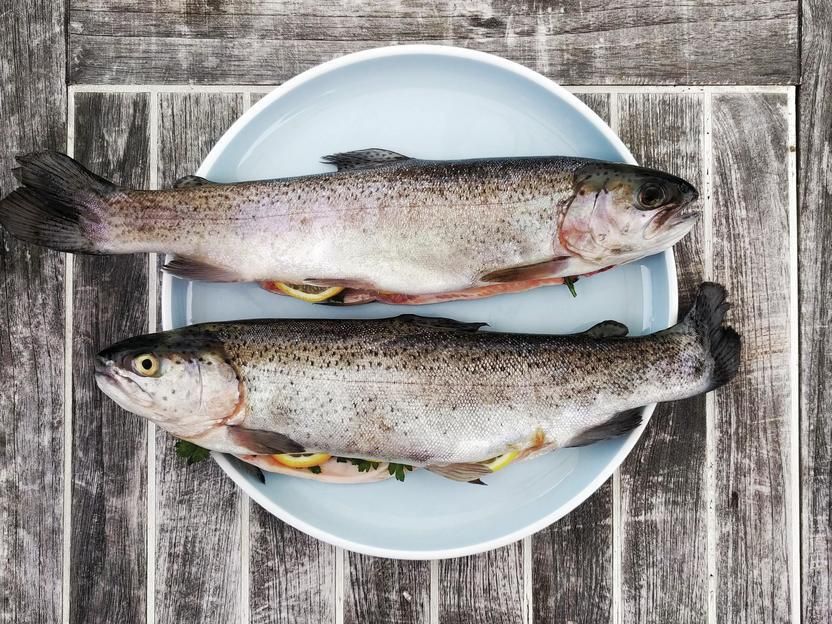Cell-based fish from the bioreactor
Alternative to fishing
Advertisement
Already about 90 percent of all fish stocks are considered maximally exploited or overfished. But as the world's population continues to grow, more and more people rely on fish as a source of protein. Bluu GmbH – a spin-off of the Fraunhofer Research and Development Center for Marine and Cellular Biotechnology EMB – has a solution to the problem. The company specializes in the production of cell-based fish, which is made from real fish cells and grown in a bioreactor. Unlike wild-caught fish, this is not at the expense of animal welfare.

Symbolic image
Gregor Moser on Unsplash
Bluu Biosciences is the first company in Europe to specialize in the development and production of cell-based fish. Worldwide, there are currently only a handful of companies operating in this field. Bluu Biosciences is thus closing a gap in the market: Just about everywhere today, more fish are caught than can naturally regenerate. This threatens the basic food supply of hundreds of millions of people. Cell-based fish, produced with the help of modern biotechnology, can make decisive contribution to secure the global supply of animal protein in the future.
“We see a fast-growing market here. The future belongs to products manufactured in a circular economy,” says Dr. Sebastian Rakers, founder and managing director of Bluu GmbH. In May 2020, he launched the company together with Simon Fabich. Their aim is to introduce the products to the market via restaurants as a first step. Later, the products will also be supplied to supermarkets. Rakers cites the end of 2023 as a realistic date for market launch. The portfolio will initially include hybrid products such as fish balls, fish sticks and fish tartar, which are made up of a mix of cell components and vegetable proteins. Fish fillet is not going to be market-ready until a later date since more research is needed. The challenge is to develop a porous structural framework that allows sufficient nutrients and oxygen to reach the cells. “This is essential to ensure that the cells are growing on the structural framework and form in the same way as they would in natural fish tissue,” explains the marine biologist, who has been doing research with fish cells at the Fraunhofer EMB for twelve years.
Cell lines from adult stem cells
Dr. Rakers and his team isolate the cells from a biopsy coming from a piece of adult fish tissue. The isolated cells, similar to progenitor cells or adult stem cells, are then multiplied in the laboratory in an in-vitro culture. Since they do not age, they can divide infinitely. The cells are then fed with a nutrient medium in the bioreactor. The reactor currently comprises a maximum of five liters. However, to obtain a marketable product, a larger reactor is required. “We are not there yet, because we first have to refine the process steps needed by the cells to grow. Our current challenge is to take the step towards industrial production.”
Free from genetic engineering, antibiotics and environmental toxins
The benefits of cell-based fish production are numerous. “There is no need to slaughter fish, and ideally a biopsy is only required once,” the researcher lists as examples of the many advantages. Thirty percent of all fish stocks are overfished, while sixty percent are exploited to the maximum. Non-land-based aquaculture, on the other hand, which has grown rapidly, especially in the last decade, and is associated with factory farming, is causing pollution of the oceans and eutrophication of waters, especially in areas with little flow. Other benefits of cultivated fish are its high nutritional value as well as its availability and the associated short supply chains. Fish products made from fish cells are free from genetic engineering, antibiotics and environmental toxins. They can be produced on-demand in a decentralized manner. Unlike aquaculture, a cell-based factory can be set up anywhere in the world.
Production free of fetal calf serum
Currently, researchers are focusing on optimizing the medium to make sure the fish cells are produced in a cost-effective manner and to refine cell properties such as flavor and texture. This is achieved, for example, by increasing the proportion of omega-3 fatty acids as an important flavor carrier. The technology required for this was outlicensed from the Fraunhofer EMB. In addition, researchers are working to replace fetal calf serum (FCS) with other, plant-based growth factors and achieve FCS-free production. “FCS is derived from the blood of cow fetuses and is a major component of many growth media needed to grow and culture cells in cell cultures,” Rakers explains. “Our first prototype will be completely FCS-free.” Bluu GmbH continues to cooperate closely with Fraunhofer EMB in its research work.

























































